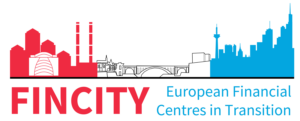The project at a glance
-
Start date:01 Jul 2022
-
Duration in months:36
-
Funding:FNR – Luxembourg
-
Principal Investigator(s):Prof Markus HesseDr Sabine Dörry (external)
About
FINCITY is a multidisciplinary research project that seeks to discuss the future of financial market places (such as Luxembourg City) in the light of current socioeconomic events, most notably the decision of the UK to leave the European Union (Brexit) and also the implications of the COVID-19 Pandemic. There is some indication that these two events or developments have contrasting implications for the centres of the services industries in general and financial market places in particular: changes associated to Brexit have made corporations to leave London, UK, and to re-locate to other financial centres such as Amsterdam, Netherlands; Praris, France; Frankfurt, Germany; or Luxembourg. The COVID-19 Pandemic has shed some light on the crowding of people (workforce, population) which is considered critical for the spread of infections; also, measures undertaken in order to stop the disease from spreading further may hinder the free flow of people or workforce, which seems essential for these services capitals. The project takes these recent developments as a starting point and aims at exploring its short and longterm
implications for the financial centres. As a result, the more general pathways of urban development will be studied as
well. We propose to explore these processes through the analytical lens of land markets (property), as we guess this is one of the most useful indicators not only for assessing the sectors’ demand for ’space’ (most notably office floorspace, associated buildings, districts), but also for identifying its impact on concurring sectors such as housing (in particular), and thus on urban policies in more general terms. For conducting field research, we have selected the cities of Dublin, Ireland, Frankfurt/Main, Germany, and Luxembourg City — all three have in common that their economies are dominated by the sectors above, while they are of comparable size (small or mid-range metropolises) and facing similar challenges as of housing, mobility and urban development.
Organisation and Partners
- Department of Geography and Spatial Planning
- Faculty of Humanities, Education and Social Sciences (FHSE)
- Luxembourg Institute of Socio-Economic Research – LISER
- Goethe University Frankfurt/Main
- Trinity College Dublin
Project team
- Prof Markus Hesse, PI
- Dr Sabine Dörry, PI, LISER (external)
- Dr Thomas Sigler, Project member
- Sara BENCEKOVIC, Project member
- Brian Longobardi, Project member, LISER (external)
- Maedhbh Nic Lochlainn , Project member, University College Cork (external)
- Susanne Heeg , Project member, Goethe University Frankfurt, Main (external)
- Martin Sokol, Project member, Trinity College Dublin (external)
Keywords
- Financial centres
- geography
- property markets
- urban development
- Luxembourg City
- Frankfurt/Main, Germany
- Dublin, Ireland
